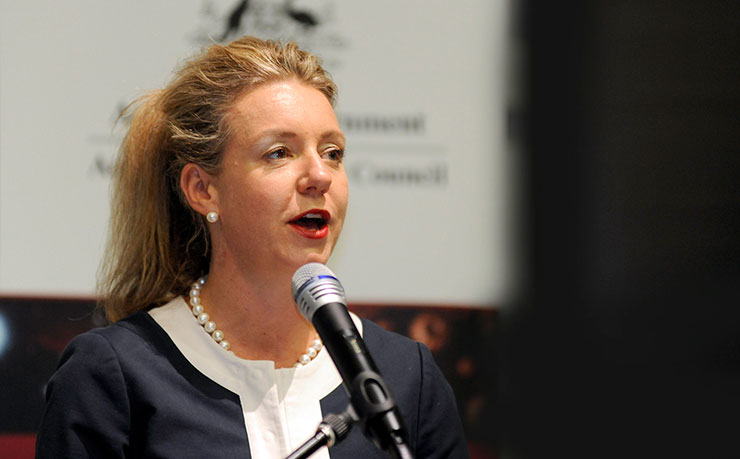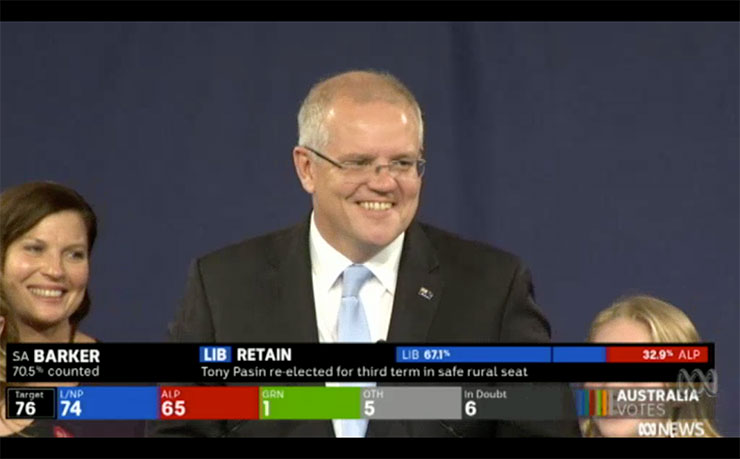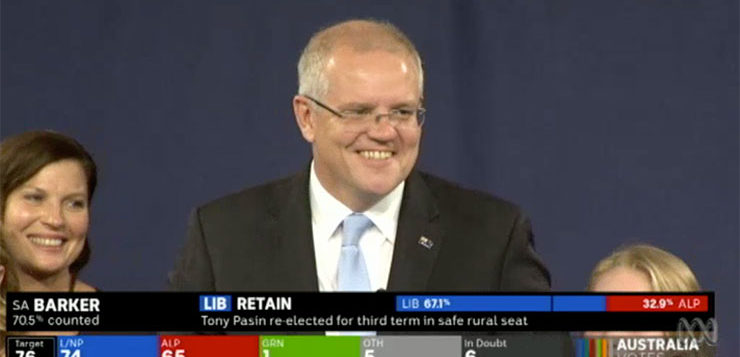‘Grant from Auditing’ has dropped ‘Scotty from Marketing’ right in it. And the net result is a stench of corruption enveloping the Morrison government. Ben Eltham explains.
Summer rains finally fell on large parts of New South Wales this week. They didn’t fall everywhere, and much of inland Australia is still in drought, but enough rain fell where it was needed to allow weary fire authorities to announce that the New South Wales bushfires were finally contained.
For different reasons, Scott Morrison has also had a difficult summer, so the Prime Minister would no doubt have been pleased the bushfire emergency he so badly mishandled is now receding. With Parliament back and the serious matter of COVID-19 Coronavirus to attend to, Morrison could be forgiven for thinking that February would be the month where the government could regain the political initiative.
But that’s not happening, because the government finds itself mired in a series of corruption scandals.
The key issue, as it has been for weeks now, is the sports rorts affair. As we now know, roughly $100 million in sports grants were distributed in a completely corrupt manner by former Sports Minister Bridget McKenzie before the 2019 federal election.
The scandal blew up after the National Audit Office released a devastating report into the orgy of pork barrelling.
The government’s initial response to the Audit was to try and downplay it: a variation of the classic “nothing to see here, folks” line. Morrison himself argued many times that no rules had been broken and that all the projects funded in McKenzie’s dodgy process were eligible.

That approach proved unsustainable, as the media turned its attention to the grants program and uncovered multiple instances of highly dubious decision-making. Huge grants to fancy rowing clubs in Mosman, grants for female change rooms to clubs with no female players, grants to a shooting club that McKenzie herself was a member of, grants that sporting clubs boasted about before even receiving them – the more journalists dug, the worse things seemed.
The Audit report was always going to be difficult to wriggle away from. The report set down, in black and white, a devastating series of findings about the sports grants program.
An established funding program was subverted by a “parallel process” of political decision making inside McKenzie’s office, quite transparently driven by political interest. Questions were raised about the program’s probity by senior bureaucrats, only to be batted away by McKenzie and her staff. A colour-coded spreadsheet was even drawn up, one that had nothing to do with the merits of the funding applications, and everything to do with the Coalition’s re-election strategy.
As former senior New South Wales judge Stephen Charles QC argued, this was not just ministerial misconduct; it was corruption.
So, after weeks of defending her, Morrison bowed to the inevitable and sacked McKenzie. After a hastily convened investigation by Morrison’s hand-picked Secretary of the Department of Prime Minster and Cabinet, Phil Gaetjens, McKenzie was sent on her way.
On the day he sacked McKenzie, Morrison announced that Gaetjens’ report found that McKenzie had erred, but that the program itself was sound. Exactly how Gaetjens managed to come to that conclusion is something that has puzzled journalists and onlookers. If the program was sound, why was McKenzie sacked for rorting it? And if McKenzie rorted it, how could the program be sound?
Just to make matters more opaque, Gaetjens’ report was never released, with Morrison claiming that it was a cabinet document. He therefore kept it secret. It’s marvellous stuff, this open government business.
Given the level of misconduct revealed by the Audit Office, Labor and the minor parties were always likely to make the sports rorts scandal a priority for the new Parliamentary year. And so it proved yesterday, when the Auditor-General himself and a key auditor from the Office were called to give evidence before a Senate Committee.
In scathing testimony, Auditor-General Grant Hehir and senior auditor Brian Boyd demolished the government’s position with a few well-chosen lines.
Were all the grants eligible, Senator Eric Abetz asked Boyd? No, answered Boyd.
In fact, as many as 43 per cent were not eligible. Boyd went on to explain why. Some applications were late. Some projects had started their work before they signed the funding agreement. Some had actually finished the work.
As Boyd told the Committee, “If you’ve completed your work, or in some cases — as in this one — you’ve even started your work before a funding agreement is signed, you’re not eligible to receive funding.” Oops.
It got worse. We also found out that the Prime Minister’s office was intimately involved with McKenzie’s office in drawing up the dodgy list of grant recipients. Auditor-General Hehir told Senators there were “direct” communications between Morrison’s office and McKenzie’s, including at least 28 versions of the now-notorious colour-coded spreadsheet that laid out the various sports grants by marginal seat.
The Auditor-General described a process where key advisors from Morrison and McKenzie’s offices haggled over which projects to fund, using the spreadsheet as the basis for their decisions.
To say this looks bad for the Prime Minister is an understatement. He has been caught out in a particularly ham-fisted cover up, one that looks all the more ill-judged now the facts have come to light. Given the level and detail of communication between his office and Bridget McKenzie’s, it’s hard to see how he can plausibly argue he wasn’t privy to the rorts.
Not for the first time, Morrison and his government have got themselves into trouble because of their serial inability to tell the truth, and Morrison’s apparently unstoppable impulse to try and brazen his way out of political trouble.
Back in January, for instance, Morrison went on national television and told the Seven Network’s Sunrise program that “every single one of the projects that was approved was eligible. Every single rule was followed in relation to the program”. That was manifestly untrue.
Yesterday’s testimony also leaves Secretary of the Department of Prime Minster and Cabinet, Phil Gaetjens in a tricky spot. The day McKenzie was sacked, February 2, Morrison told reporters that Gaetjens had cleared the sports grants program of any political interference:
“What the Secretary has been asked to do here is assess the Auditor-General’s report and consider the fairness elements of that. And he’s made a very clear finding which said that the Minister actually did not take as a primary consideration those factors, those political factors, so he’s actually rejected that as a position.”
It’s impossible to reconcile that statement with what the Auditor-General and his staff told the Senate yesterday. Either the Auditor-General is wrong, or the most senior public servant in the land is, or Morrison is lying about what is in Gatejens’ report. I think most of us can draw our own conclusions in this matter.
Late on Friday, Gaetjens released a short summary of his report in a submission to the Senate Committee investigating the sports rorts — but not the report itself. The summary argued that “there were some significant shortcomings with respect to the Minister’s decision making role.” But Gaetjens also wrote that “the evidence I have reviewed does not support the suggestion that political considerations were the primary determining factor in the Minister’s decisions to approve the grants.” This seems almost laughable, given what the Auditor-General has said.
The sports rorts affair has once again exposed grave deficiencies in the way in which Australia’s Westminster government holds elected leaders to account. Scott Morrison is the Prime Minister and, short of a successful vote of no confidence, there are ultimately very few sanctions that Labor and the Parliament can apply.

As long as Morrison retains the confidence of the Liberal Party, he can tough this one out, as damaging as it will be to his political credibility.
Given what we’re seeing in established democracies right now, from the US to the UK to India, Scott Morrison’s enduring problems with the truth could perhaps be seen as a lower order issue.
But Morrison’s serial lying matters, because it speaks to his ongoing subversion of democratic norms. Ordinary citizens are rapidly losing trust in Australia’s democracy, and the decline has been among the more precipitate of all western democratic systems in recent years.
In large part this is because of a widespread perception that the entire political class that rules Australia is corrupt.
Most of us don’t follow the intricacies of Commonwealth grants administration closely. But we can sense, intuitively, that much of what the people who run this country say is often untruthful. We see politicians blatantly rorting spending programs, whether it be travel entitlements or sporting grants, with essentially no consequences.
And we can see that there is one rule for the powerful, and another for the rest of us.
BE PART OF THE SOLUTION: WE NEED YOUR HELP TO KEEP NEW MATILDA ALIVE. Click here to chip in through Paypal
Donate To New Matilda
New Matilda is a small, independent media outlet. We survive through reader contributions, and never losing a lawsuit. If you got something from this article, giving something back helps us to continue speaking truth to power. Every little bit counts.




